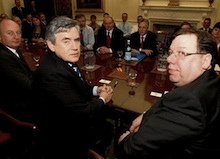
Transferring policing and justice powers from the London government to the Belfast administration cannot be held hostage to unionist demands on contentious sectarian parades, Sinn Fein leader Gerry Adams warned today.
There are less than 24 hours left before the Dublin and London governments publish proposals in an attempt to break the stalemate.
26-County Minister for Foreign Affairs Micheal Martin and British Direct Ruler Shaun Woodward returned to Hillsborough Castle outside Belfast today to chair new talks aimed at breaking the deadlock.
After a dramatic three days at Hillsborough earlier this week, Mr Cowen and Mr Brown left Belfast on Wednesday evening having given the parties 48 hours to break the deadlock in talks and secure a political agreement.
Speaking today at Hillsborough, Mr Adams said: “Anybody who thinks that the price of policing and justice is a walk down the Garvaghy Road or through Ardoyne, it is just ridiculous.”
For the past two decades, the nationalist communities of the Garvaghy Road in Portadown and Ardoyne in north Belfast have resisted sectarian parads through their communities, often in the face of intense Crown force and loyalist violence.
“Let’s deal with the issues sensibly,” said Mr Adams. “Let’s do our best to make sure the outstanding matters of this agreement are implemented.
“Nothing is going to be sorted out if it is talked up as absolute. We still don’t have an agreement but it isn’t over until it is over.”
This morning Sinn Fein met with both governments and with the Democratic Unionist Party (DUP). Mr Adams also briefed party officers today ahead of a plenary session with other parties at Hillsborough.
On Wednesday, the party expressed “deep disappointment” following the failure to secure a deal on the implementation of the St Andrews Agreement and the determination of the DUP to bring the marching issue into the mix. The St Andrews Agreement itself arose out of many years of effort to implement aspects of the 1998 Good Friday Agreement.
The DUP has insisted that a date for transferring justice powers from London to Belfast must be accompanised by a move to ensure coat-trailing loyalist parades once again pass through nationalist communities. The abolition of the Parades Commission, which adjudicates on the routes of sectarian parades, has been a key DUP ambition.
Mr Adams said his party remained focused on the implementation of the two agreements. He said his party also wanted to see a resolution to the issue of sectarian parades.
“Aside from wanting to build relationships with those from the Orange tradition we also represent the vast majority of people in those communities who are directly effected by contentious parades.
“However, everybody knows that issues in the talks need to be dealt with in their own right -- as outstanding elements of the Good Friday and St Andrews Agreements. This does not include allowing Orange marches into areas without the invitation or consent of local people.”
In a draft document presented at the talks on Tuesday, the British and Irish leaders proposed to set a date in early May for transferring policing and justice powers to the Northern Executive and suggested new mechanisms for addressing the parades issue.
In the draft, the governments also suggested proposals that seek to find common ground on other long-standing concerns such as legislative protections for the Irish language and institutional sectarianism.
The move by the two governments, followed by a round-table talks session including the SDLP and Ulster Unionists, led to speculation among some commentators on Tuesday evening that a deal could be reached. But by the morning, after several hours of fruitless discussions, the mood had turned sour.
DEAL ‘UNLIKELY’ - DUP
DUP finance minister Sammy Wilson said his party was still in the “mindset” to do a deal. He added they were capable of making a “sustainable agreement” which members could stand by -- ahead of the resturn of Mr Brown and Mr Cowen to Belfast.
“I would rather have a ‘Made in Ulster’ deal than something which is brought here and imposed on us, whether a suggestion or a proposal from London or Dublin,” he said.
“As far as individual marches are concerned I don’t think that’s the job of negotiators,” he said, suggesting that required negotiations at local level.
“To think politicians guarantee outcomes I think is really living in cloud cuckoo land,” he added.
Earlier, another senior DUP member said he did not think a deal would be reached before the government’s deadline on Friday afternoon.
“We are not going to walk out,” said DUP MP Gregory Campbell. “So we haven’t stopped the talks and we are not going to walk away - now if that takes today or tomorrow or next week or whatever length of time it takes, let’s get an equitable outcome in which all sides are winners.”
RETURN AWAITED
Amid the posturing, it seems unlikely that any deal will be reached without a final arm-twisting by the two governments this weekend. However, Sinn Fein has clearly grown wary of making concessions under the media spotlight only for the unionist parties and the governments to renege on their agreements when the cameras have moved on.
Sinn Fein’s Alex Maskey said there were doubts over the DUP’s intention to fulfil their obligations.
“They need to make their mind up - do they want to keep putting obstacles up or do they want to resolve the existing ones,” he said.
“To have the powers for policing and justice transferred is not a victory for any one side.
“It’s not a win for anybody, it’s common sense - it’s the completion of devolution as required under St Andrews, so I don’t see why anyone should present that as a victory. Unless you don’t want it to happen.”
He warned that reaching a deal would be a failure, “and a serious, disappointing one at that”.
![[Irish Republican News]](https://republican-news.org/graphics/title_gifs/rn.gif)
![[Irish Republican News]](https://republican-news.org/graphics/title_gifs/harp.gif)

